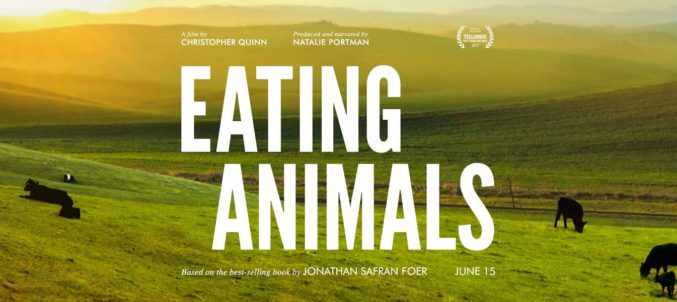To kick off my book review blog series, I just had to talk about the most recent (and most influential) book that I have read in 2019: Jonathan Safran Foer’s Eating Animals. Although not a recent publication – it was first published in 2009 – Foer’s investigation into the world of meat production is every bit as relevant today as it was 10 years ago.
This book is a masterful blend of hard, cold facts and emotive storytelling. The first chapter draws us in with Foer’s insightful observations on how attitudes towards food have developed within his family (and throughout the Western world) over the last few generations. He discusses his grandmother’s experience as a Jewish fugitive during the war, surviving off whatever she could scavenge in the forests of Europe, and how, later in life, in a world of wasteful consumerism and filled fridges, she was still ‘unable to shake the desperation’ of starvation. The way we think of food as a society and the way we choose to feed ourselves is representative of culture as a whole. So what does it say about us that consistently and repeatedly, when faced with the truth of the meat industry, we prefer to look away, to commit to a kind of enforced cultural forgetting?

Foer explains that whenever people heard the title of the book, they immediately assumed that it was a case for vegetarianism. He makes the fascinating point that this is ‘a telling assumption, one that implies not only that a thorough inquiry into animal agriculture would lead one away from eating meat, but that most people already know that to be the case’. We already know that factory farming is unethical, so why don’t we care!?
Foer states from the outset that this book is, in fact, not a ‘straightforward case for vegetarianism’, and that his main motivation for setting out on the project was fuelled by a desire to make more informed decisions about the kind of diet he would feed his newborn son. He delves deep into the heavily veiled world of factory farming in the US, relaying in horrifying detail the reality of an industry that produces most of the world’s meat, following the process from “farm” to plate. The figures are terrifying.
The preface to the UK edition of the novel makes it clear that although the novel focusses on animal agriculture in America, ‘a British reader who cares about the issues raised in this book should not find any peace in being British’ as ‘approximately 95 percent of poultry and 60 percent of pigs are raised on factory farms’ in conditions very similar to those described in his book. This number has only increased since publication.

I have to admit that, having been a vegetarian myself for just under a year now, Foer was kind of preaching to the converted on this one. However, I picked up this book at a time when my motivation was lacking, I was getting tired of missing out on some of my favourite meals and so what if I had a ham sandwich here and there, or ate a little fish on holiday? But by the time I put this book down I was convinced that a vegetarian diet was not only the right decision to make, but nothing short of a moral responsibility. Previously, my reasons for choosing a vegetarian diet were principally environmental, now those reasons are reinforced by an empathy for the hundreds of thousands of animals abused, tortured and inhumanely killed by the industry every year.
Foer’s “not straightforward case for vegetarianism” contains testimonies from an eclectic collection of individuals involved in the meat industry. From a vegetarian rancher to a factory farmer and even a vegan responsible for designing slaughterhouses, this book does not shy away from the difficult questions even when they turn up even harder answers. His conclusions do not necessarily condemn meat-eating in itself, just the harmful practices of factory farming. He is actually surprisingly supportive of the rise of family farming in the US and the need to support these smaller scale industries for the sake of our planet and our health.

Although he claims in this book that he has ultimately settled on the decision to feed his family a purely vegetarian diet, he has recently reassessed this stance in the wake of the 2018 documentary by the same title that was produced and released alongside actress Natalie Portman. In an interview for the Los Angeles Times published in 2018, Foer compares his non-binary relationship with meat to most people’s relationship with honesty: ‘I think of myself as an honest person; I try to be honest. But if one were to create and all-or-nothing binary with honesty: Are you an honest person or not and honest person? Most people wouldn’t even know how to answer that question.’
It is this stark honestly that makes this book such a compelling read. Foer’s work is a well-rounded, deeply considered investigation of the facts that we, as a society, regularly and repeatedly choose to ignore. His writing is laced with a Ronson-esque mix of storytelling, anecdote and straight hard fact which results in an, at times, hard-to-stomach but ultimately enjoyable read. I agree with Time Out magazine’s statement that ‘[it] should be compulsory reading. Read this book.’
